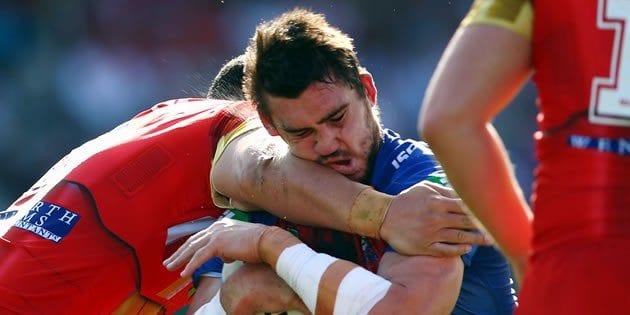Once again, following an incident that saw the Newcastle Knights down a player through no fault of their own, the discussion has been raised as to what can be done in this very situation.
For those who did not see the incident, yesterday a Leeson Ah Mau tackle collected Knights front rower Kade Snowden high, rendering him concussed and ending his game.
The incident occurred early in the game, robbing the Knights of their best front row forward, and leaving them short a player in their rotation on their interchange bench.
Ah Mau was placed on report and will likely serve a multi-game suspension. He will pay the price for his tackle, but the Knights suffered.
This happens way too often to simply be written off as bad luck to the team on the receiving end of the injury through foul play.
Rather than sit back and complain, here are two suggestions to help fix the problem.
Change the sin bin rules
I know I have mentioned this before, but it’s something that really has me stumped.
Right now the sin bin is pretty much useless. We see a player sent there should they throw a punch, or hold a player down too long after a break, but otherwise it is a very effective tool that is not being used.
Yesterday’s incident did not warrant a send-off. Ah Mau hit Snowden high, but there was no great intent, and looked to be zero malice.
The hit was however worth ten, or five, minutes in the sin bin. Although Snowden was missing for the game, at least the Knights would gain some sort of advantage as a result.
The sin bin is there to deter foul play, and last time I checked, a series head high tackle, was an act of foul play.
Lifting tackles should also come under this ruling, but that’s another matter for another day.
Reduce an interchange
This is an idea I have supported for a while and saw it mentioned yesterday and thought I would put it forward.
Following Snowden’s being ruled out of the game, Ah Mau should have been removed from the game and not been able to return, however he could be replaced.
The Dragons would not lose a player as they would for a send-off, something too severe for the incident in question, but they would also be down a player for the rest of the game.
For this to work an independent doctor would have to make the call of ruling a player out, and the player who was deemed most responsible would have to leave the field as soon as the injured player was ruled out.
Saying it would take five to ten minutes to conduct a test and rule a player out is about right, and although the offending team would still hold an interchange advantage for five to ten minutes, it’s still better than the current set up.
Although I have never seen it employed, and severely hope it never is, it’s not out of the question for a player to target a superstar member of the opposing team and risk serving a suspension later.
This would add a real element of dangerous to a tactic I hope is never EVER considered.
A third suggestion I have seen floated is that of an 18th man coming in should a player become injured through an act of foul play.
I see some merit to this, but I don’t like the idea of a player warming up and keeping warm on the off-chance he may be used. There’s also the loophole of a player acting more hurt than he is to enable a fresh player to come on.
Neither of the two above suggestions are perfect, but I really think there has to be SOME advantage to the team that is otherwise disadvantaged through no fault of their own.
Taking the lead no longer a guarantee
It’s absolutely incredible to see the amount of teams that run out to an early, and sometimes big lead, only to be ran down and beaten.
A few years ago, an early 18-0 lead became a question of ‘by how much’, but now it’s by no means game over.
The Warriors ran out to a 10-nil lead against the Sharks and looked home, only to be run down and beaten. The Raiders led 18-0 over the Cowboys, yet didn’t come away with two points.
Two other games this weekend seemed like 50-nil floggings in the making. The Roosters and Dragons looked home inside 20 minutes, yet fell behind, only to retake the lead and hold on.
Earlier in the year the Tigers had the Raiders in all sorts of trouble at 22-0, only to be beaten 30-22.
I’m not really sure what could cause such massive swings in momentum. I suppose mentally at 22-0 down you’d be a little more desperate than if a mile in front.
I believe it is the type of football being played. The Roosters were on fire early on against the Dogs. They were chancing their arm and playing free.
The Dogs were rigid, and almost seemed nervous.
After falling behind the momentum completely changed and the Dogs were the ones playing the expansive footy.
Sometimes I think sides are too worried about structures and set plans to worry about playing the game that is in front of them.























